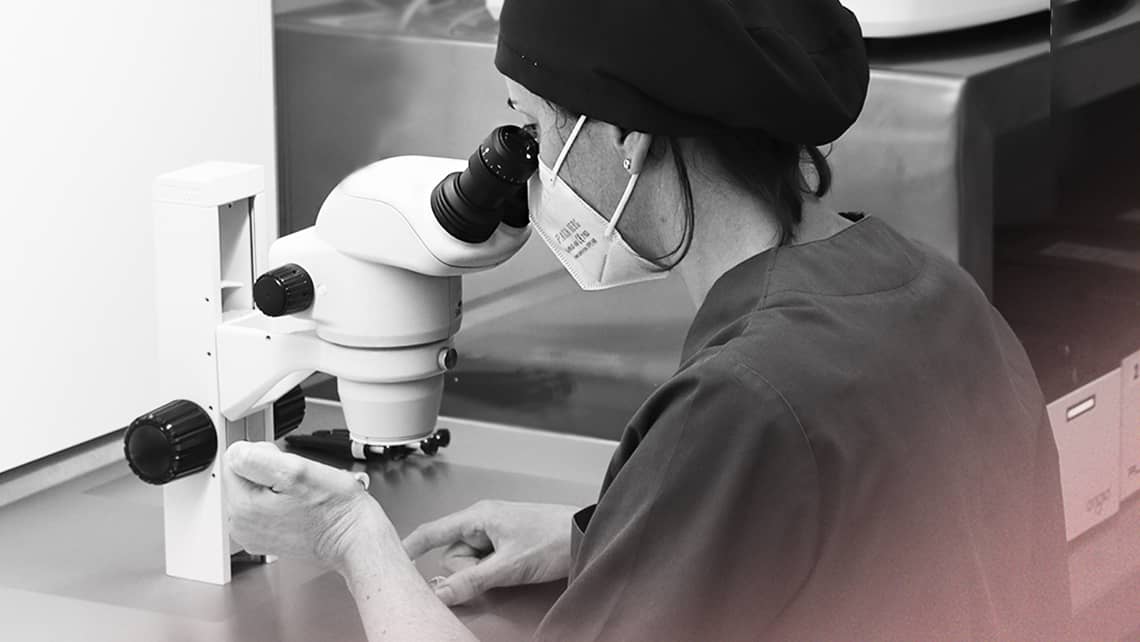
Is the EmbryoGlue® culture medium that is used during embryo development efficient?
The embryo transfer procedure is one of the most crucial and decisive procedures carried out during an in vitro fertilisation (IVF) treatment. For this process to be successful, the culture media in which the embryos develop are essential in the IVF laboratory. These are intended to reproduce the physiological conditions of the female reproductive system for optimal success rates. In recent years, one strategy to improve results has been the use of culture media developed specifically for use in embryo transfer to help facilitate implantation. One of these culture media is EmbryoGlue®.
Índice [Ocultar]
What is the EmbryoGlue® culture media?
EmbryoGlue® or “embryo glue” is enriched in hyaluronate or hyaluronic acid (HA) which is a macromolecule found naturally in many tissues and organs of the human body, including the uterus.
How this culture media works?
Hyaluronic acid, the main component of EmbryoGlue®, is an important element in the biological processes associated with cell adhesion, migration and proliferation. This molecule could make it easier for the embryo to correctly adhere to the endometrium, as it’s known this tissue also synthesises this compound, precisely during the phase of the menstrual cycle in which embryo implantation takes place. In addition, HA would bind to its receptor CD44, which is found both in the endometrial tissue and in the embryo, thus aiding the dialogue between them and promoting embryo implantation. The medium viscosity, due to its particular HA-rich composition, would also help.
Is EmbryoGlue® effective?
At present, there is little material published on this culture medium efficiency and therefore it cannot be confirmed that it significantly increases clinical outcomes.
There are some publications such as the Cochrane review of 2020 in which 26 studies (6704 patients) comparing embryo transfers using hyaluronic acid in high concentrations versus low concentrations or no HA. It concludes that the high concentration of hyaluronic acid present in EmbryoGlue® could improve the clinical pregnancy and live birth rate in IVF and also slightly decrease the miscarriage rate [1].
In another study published in 2018 by Fu et al. group which studies the use of EmbryoGlue® in devitrified embryos for cryotransfer (CT), they only saw improved outcomes in those patients who had previous implantation failures but not on those undergoing their first or second CT [2].
What is the Instituto Bernabeu Group possition to the media culture EmbryoGlue®?
In 2019, the Instituto Bernabeu team presented a research study at the European Society of Human Reproduction and Embryology (ESHRE) congress, the most important in the world in the field of reproductive medicine, to find out whether the use of EmbryoGlue® as a culture medium for embryo transfer improves results. The study is a prospective randomised controlled trial that concludes that, as per our experience, the use of EmbryoGlue® does not improve clinical outcomes compared to other conventional culture media. Furthermore, although the differences are not statistically significant, a slight increase in the miscarriage rate is observed [3].
In conclusion, it seems that further research and work is still needed to elucidate whether the use of this medium is effective in improving the results with respect to other embryo culture media or whether, on the contrary, its use is only indicated for certain cases such as repeated implantation failures.
Elisa Álvarez, an embryologist at Instituto Bernabeu
Bibliography
- Heymann D, Vidal L, Or Y, Shoham Z. Hyaluronic acid in embryo transfer media for assisted reproductive technologies. Cochrane Database of Systematic Reviews. 2020.
- Fu W, Yu M, Zhang XJ. Effect of hyaluronic acid-enriched transfer medium on frozen-thawed embryo transfer outcomes. J Obstet Gynaecol Res. 2018 Apr;44(4):747-755.
- Ten J, Rodríguez A, Guerrero J, Ortiz JA, Moliner B, Bernabeu R, Sellers R. Embryoglue® as medium for embryo transfer: does it really improve the outcomes? A prospective randomized controlled trial. ESHRE 2019.
